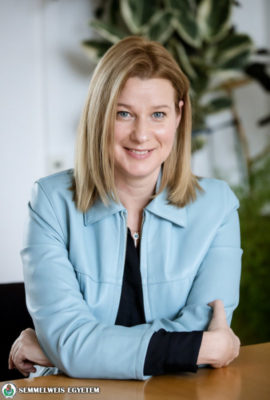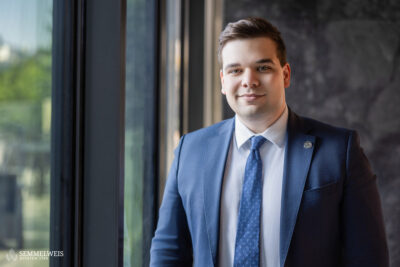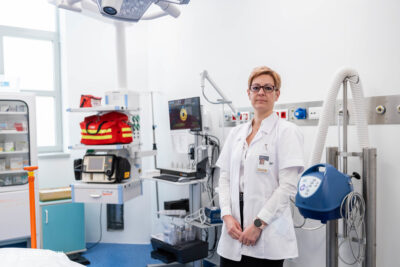“As the representative of conductive education in Hungary, we have to represent a sort of conscious continuity; preserving our traditions and nurturing our roots are very important”, said Dr. Renáta Földesi, newly appointed director of the Institute of Conductive Pedagogy at András Pető Faculty from 1 November, 2020. “Besides preserving the traditions, it is also our task to pass on a sustainable, innovative conductive pedagogy to the next conductor generation, therefore, as a new director, it is among my responsibilities to develop a strategy about what type of innovations we might join in, about how to react to social demands regarding the institute’s training contents”, pointed out Dr. Renáta Földesi.
Dr. Renáta Földesi graduated as a conductor herself at the predecessor of András Pető Faculty, at András Pető Institute of Conductive Education and College for Conductor Training. After having acquired her Master’s degree, she acquired her PhD degree in the area of education. She returned to the Institute of Conductive Pedagogy in 2011, where she became deputy director in 2018, afterwards she ran the institute as commissioned by the dean. She was appointed as director of the institute on 1 November, 2020 – Dr. Renáta Földesi recalled.
 “The institute has various activities: it is our responsibility to prepare the students in and beyond the boundaries of Hungary (also international students starting from 2021) to the conductive profession and to the efficient solution of the tasks of conductive education”, pointed out Dr. Renáta Földesi.
“The institute has various activities: it is our responsibility to prepare the students in and beyond the boundaries of Hungary (also international students starting from 2021) to the conductive profession and to the efficient solution of the tasks of conductive education”, pointed out Dr. Renáta Földesi.
“The handling of courses related to conductive education belongs to the responsibilities of the institute. Besides the biomedical basis, we also transfer the theory and practice of conductive education to our students. Our institute plays an important role in conductor training, the continuous renewal and updating of the conductor BA programme subjects is among our priority tasks”, Dr. Renáta Földesi said.
Dr. Renáta Földesi recalled that the training development activities of the faculty and the extension of the training palette began to develop to a great extent in the past three years, in which the Institute of Conductive Pedagogy played a significant role related to the preparation of new trainings, the accreditation process and the ensuring of teachers required for this. Among her responsibilities, she also highlighted the harmonization of the training programme with the university expectations according to curriculum reform.
“Our teachers are connected to the important theoretical and practical issues of conductor training with their research topics, they focus on gap-filling researches or less researched areas. The experiences acquired in the course of the research and the revealed results are continuously built in the curriculum of the training programme or they appear in the training offer as a new subject element. The research workshops established at the faculty in 2019 serve this goal as well”, emphasized Dr. Renáta Földesi.
She highlighted the workshop focusing on educational history and theoretical research led by herself, the primary aim of which is the exploration of András Pető’s and Mária Hári’s legacies. There is an enormous archive database available from the past of conductive education, which was planned to be processed and to be made researchable by the institute. As a result of this, the so-called KONTPEDIA database was established, with the help of which the literature of conductive education was made accessible to students electronically, and they also managed to digitalize archival data as part of the project – Dr. Renáta Földesi said.
Besides operative educational activities, research also plays a significant role in conductive education, therefore our teachers are represented in all of the research workshops of the faculty. Dr. Renáta Földesi also highlighted the institute’s publicity activities, which materialize more and more along quality criteria, and she also pointed out that the teachers of the institute participate in university researches beyond researches on the faculty level.
The new director considers it as one of her most significant goals to take forward the work of predecessors; the ensuring of continuity is of great importance for her. Therefore, she aims at paying special attention to professional events such as the Pető Commemoration, the Pető Professional Day related to Hungarian Science Festival or the Mária Hári Professional Symposium, where theory and practice meet. She also emphasized the Conductive World Congress that is organized in every three years.
“Besides preserving our traditions, it is also an important task of mine to pass on a sustainable, innovative conductive pedagogy to the next conductor generation. The work done by the Institute of Conductive Pedagogy is highlighted in conductor training; we have sort of a leading role, the conductive community all around the world is watching how we take a position in certain issues, which is an enormous responsibility. It is also among my tasks to find the focus not just in research strategy but in the overall institutional strategy construction regarding what type of innovations we might join in, how to react to certain social demands”, Dr. Renáta Földesi said.
“It is a great challenge to develop a system about how to make the educational profession more appealing, since the replenishment in human resources is extremely important as far as the future of the institute is concerned. Therefore, it is my goal to create such an inclusive, supportive, inspiring, attentive environment where my colleagues feel that we recognize all types of invested instructor energy”, Dr. Renáta Földesi emphasized.
Among other things, she also has the following leadership objectives: the representation of conductive education at scientific forums abroad, the continuous addressing of the conductive world, acting as kind of a mediator as well as the building and maintaining of relations with associate professions, professional organizations.
Bernadett Bódi
Photo: Attila Kovács – Semmelweis University
Translation: Katalin Illés-Romhányi


